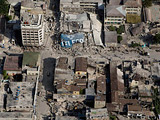Devastating Opportunities in Haiti
By Jody Ray Bennett for ISN
After what the UN has called external pagethe worst disaster with which it has ever been confronted, the massive earthquake that rocked Haiti on 12 January created a tremendous demand for humanitarian assistance that many US private military and security companies (PMSCs) are eager to supply.
Five days after the disaster, the external pageBoston Globe reported on the private security firms that were already deploying to Port-au-Prince, many of which began search and rescue operation within hours of the quake.
external pageRed24, a PSC which operates worldwide, is run by an elite, former lieutenant colonel in the UK military’s Parachute Regiment and is already “on the ground” in Haiti, hired to find four US students missing in the devastated capital.
Another company, external pageGlobal Rescue, deployed a 25-man team to Haiti and is led by “a former Navy SEAL, a member of the Army’s Special Forces and the Company's Chief Paramedic” three days after the disaster struck. They advertise: “If you have family or relatives trapped in Haiti, Global Rescue may be able to help.”
Industry critics argue that this rescue-for-sale dynamic is hardly evidence of the industry’s moral willingness to provide humanitarian assistance in Haiti. Instead, the phenomenon has been called “external pagedisaster profiteering,” where the highest bidder gets saved first, and the most important clientele are extracted before ordinary citizens.
external pageJeremy Scahill, lauded by ‘anti-mercenary’ activists - and loathed by many in the PMSC industry itself - likened this idea of “disaster profiteering” to that of Blackwater’s role in New Orleans in post-Hurricane Katrina in a blog post: “Far from some sort of generous gift to the suffering people of the US gulf, external pageBlackwater raked in some $70 million in Homeland Security contracts that began with a massive no-bid contract to provide protective services for [the external pageFederal Emergency Management Agency (FEMA)]. Blackwater billed US taxpayers $950 per man, per day.”
Furthermore, critics take issue when companies do little to camouflage opportunism when they, for instance, quickly register a new domain name such as external pageHaiti-Security.com to attract new clientele. The business end, however, sees no problem in filling what it perceives as a market need. Indeed, the critique has been external pagedocumented mostly online, where detractors argue that PMSCs are a militaristic manifestation of American corporate interests exploiting Haiti’s increased humanitarian demand for financial gain.
Those who are able to critically assess the activities of the industry seem to identify the intrinsic philosophical duality.
external pageDavid Isenberg recently wrote, “The tragedy in Haiti will represent many things to many people. For some it will be a simple moral obligation to help those in dire need. For others it will be a chance to make money.” Indeed, Isenberg notes that the activities of PMSCs in Haiti will yield “varying degrees of both” and reminds us of instances in which companies have offered to support humanitarian missions at cost or pro-bono.
This is a remarkable chance for the industry to gain global legitimacy if it is indeed interested in such a “moral obligation” before a profit margin- and certainly a potential opportunity to remove some of the stain from its tarnished reputation.
